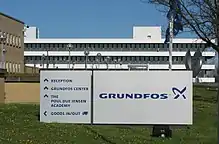Grundfos
Grundfos (Danish pronunciation: [ˈkʁɔnˀfʌs]) is the largest pump manufacturer in the world, based in Denmark, with more than 19,000 employees globally.
 Grundfos headquarters in Bjerringbro | |
| Type | Public (Denmark) |
|---|---|
| Industry | |
| Founded | 1945 |
| Founder |
|
| Headquarters | , |
Area served | Worldwide |
Key people | Poul Due Jensen (CEO / Group President) [1] |
| Products | Pumps |
| Revenue | |
| Total assets | |
Number of employees | 19,280 (2018)[2] |
| Parent | Poul Due Jensen Foundation (86%) |
| Website | www |
The annual production of more than 16 million pump units, circulator pumps (UP), submersible pumps (SP), and centrifugal pumps (CR). Grundfos also produces electric motors for the pumps as well as electric motors for separate merchandising. Grundfos develops and sells electronics for controls for pumps and other systems.
History
Grundfos was established in 1945 in Bjerringbro by the late Poul Due Jensen. He gave his company the name of "Bjerringbro Pressestøberi og Maskinfabrik" (Bjerringbro Die-Casting and Machine Factory) and not until 1967, after several changes of names, did the company get its present name.
Ownership
The Poul Due Jensen Foundation was established as a self-governing institution in 1975. Today, the foundation owns about 86 per cent, staff about 2 per cent and the founder's family about 12 per cent of shares in Grundfos Holding A/S. The aim of the foundation is the continued development of the Grundfos Group. The capital and the profits of the foundation are used solely for the aim of the foundation, that, is the profits are to be re-invested in the Grundfos companies. Grundfos Holding A/S is the majority shareholder in all the Grundfos companies. Lars Kolind was the group chairman.
Applications
SP submersible pumps for dewatering applications, dosing pumps, end suction, SP, booster sets, wastewater and solar powered solutions for set and forget requirements and many many other pumps for countless mining applications. Circulator pumps are used for heating, ventilation and air-conditioning in private homes, office buildings, hotels, etc. In industry, the pumps are used in processes, plant maintenance, and as built-in parts in Original Equipment Manufacturer (OEM) products. In the water-supply and wastewater sector, Grundfos offers pumps for irrigation, green houses and for municipal, private and industrial water supply as well as for sewage applications.
Global expansion
The Grundfos Group is represented by companies in all parts of the world. In addition, Grundfos products are merchandised by distributors in more than 50 countries.
In 2006 Hilge, a producer for pumps in sterile applications, was acquired by the group and sold to GEA[3]in 2015.
Alldos, a German manufacturer of dosing pumps and disinfection equipment, was acquired in early 2005. Alldos employed around 250 people and had a strong presence in Europe and the Middle East and Australia. Alldos were the only competitor to Grundfos's 'digital dosing' technology. Grundfos dosing products now include Alldos's corporate colour green with Grundfos black.
On December 1, 2007, Grundfos announced that it had purchased US pump manufacturer Peerless Pump Company. "Effective December 1st 2007, the Grundfos Group has acquired Peerless Pump Company. Peerless is a U.S. based (Indianapolis, Indiana and five other North American facilities) manufacturer of pumps and fire protection systems. With more than 400 employees and annual sales of USD 110 million, Peerless is Grundfos’ largest acquisition to date. Grundfos continues its aggressive growth strategy in North America."
Research and development
DKK 543m was used for research and development expenses in the 2004 financial year. In 1985, Grundfos established its own electronics production and in 1991, Grundfos Electronics was inaugurated, including a hybrid factory with clean room production.
In May 1990, the Grundfos Technology Centre was inaugurated. The centre is used for research into new materials, development of process technology and construction of advanced production equipment and machines. In 1993, development, design and product management moved into a newly built "innovation centre".
References
- "Grundfos appoints Poul Due Jensen as new CEO". Grundfos.com. Retrieved 2020-10-30.
- "Our company". Grundfos.com. Retrieved 2018-02-23.
- http://www.gea.com/global/en/news/corporate-news/2015/gea-acquirers-leading-supplier-of-hygienic-pumps.jsp
External links
Further reading
- R. Reidy (2002). Profile of the International Pump Industry - Market Prospects to 2007. Elsevier. pp. 16, 86–87. ISBN 978-0-08-094924-6.
- Liza Castro Christiansen (2012). "Grundfos Invests in Talent". In James Hayton (ed.). Global Human Resource Management Casebook. Taylor & Francis. ISBN 978-1-136-66324-6.
- Jeana Wirtenberg (2008). The Sustainable Enterprise Fieldbook: When it All Comes Together. AMACOM. p. 258. ISBN 978-0-8144-1279-4.
